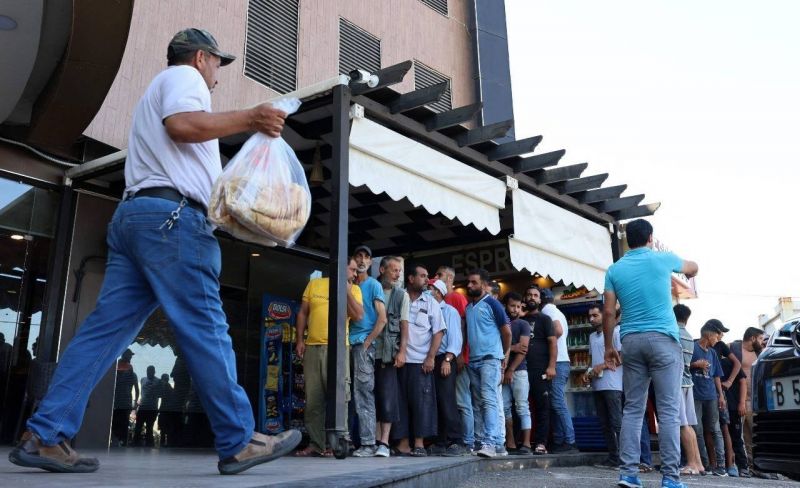
A queue of people waiting in front of a bakery, in Beirut, in July 2022. (Credit: AFP archive)
Lebanon is on the brink of collapse. Some say Lebanon has collapsed already. All economic indicators speak to a dramatic situation: hyperinflation, loss of purchasing power, growing poverty, brain drain and a disappearing middle class, the backbone of Lebanese society. Lebanese do not need economic indicators. They feel what is happening on a daily basis.
More than two and a half years after the State of Lebanon defaulted on its sovereign debt, and its government presented an economic and fiscal rescue plan, Lebanese decision makers are still failing to implement the measures necessary to pull Lebanon back from the brink. Decisions and measures taken so far are insufficient. The continuous deterioration of the situation speaks volumes.
We realize that the tasks at hand are daunting. And the context does not render the tasks easier: a polarized regional and international geopolitical environment, a frail national consensus on the most basic strategic questions, the continued presence of a large number of Syrian refugees, a confessional societal and political system with its additional layers of checks and balances, a fragmented political system in which the principle of separation of powers is hardly respected and which lacks transparency and accountability.
Many of our Lebanese friends and interlocutors say you cannot start to address the challenges at hand if you do not tackle these fundamentals. We beg to disagree.
All relevant Lebanese decision makers can and must do more now to rebuild the economic, monetary and fiscal space in Lebanon, as a first step to bringing its economy back on a path of recovery.
The government of Lebanon signed a staff-level agreement with the IMF in April of this year, in which it committed to implementing a number of specific prior actions to be taken. This would allow the IMF staff to present a program for Lebanon to its board of governors for approval. The sad reality is that almost half a year since the signing of this agreement, not one of the prior actions required for the approval and launch of an IMF program has been implemented.
This is not good enough.
The only realistic opportunity available today to get Lebanon out of the danger zone is about to be lost. For lack of focus. For lack of willingness to compromise. For lack of vision. For lack of leadership.
Yes, Lebanon can get out of the crisis. Necessary first steps have been agreed upon between the IMF and the government: The banking system is broken and harms the economy. It needs to be rebuilt and to operate in transparency. Losses and debts accumulated in the last decades need to be attributed and shared in a responsible, equitable and just manner. Small depositors cannot bear the full brunt of the crisis and should be protected. Unifying the exchange rate is imperative. Multiple exchange rates distort economic transactions and open the door for manipulation and fraud. The state needs a proper and timely budget that identifies both the revenues and the expenditures of the state, in a clear and rightful way. The central bank needs to be transparent regarding its foreign assets. A banking secrecy law is needed that allows fighting corruption and investigating wrongdoing. Capital controls are essential as a temporary measure to ensure that Lebanon has the resources to set itself on the path to financial recovery.
All this can be done. All this needs to be done, with the support of the IMF and the international community or without.
These measures are essential to rebuild the trust in Lebanese institutions, its banks, its central bank, its government, its Parliament, its political leaders. Trust has been lost and needs to be restored as a matter of priority. Without trust, there will be no liquidity in banks, no significant development cooperation and no private investment. The economic crunch would continue.
The European Union and its Member States, as well as Norway and Switzerland, are ready to stand on the side of Lebanon and its people and lend our support in this challenging period, politically and financially. But we can only support. Lebanese decision makers need to live up to their responsibilities and put the public interest first, and their legitimate particular interests second.
Lebanon can get out of the crisis. The time to act is now.
Authored and signed by:
The European Union Ambassador to Lebanon, Ralph Tarraf.
The European Union Heads of Missions Resident in Beirut, the Ambassadors of: Austria, Belgium, Bulgaria, Cyprus, Czech Republic, Germany, Denmark, Greece, Spain, Finland, France, Hungary, Italy, Netherlands, Poland, Romania, Slovakia, and Sweden; in addition to the Ambassadors of Norway and Switzerland.